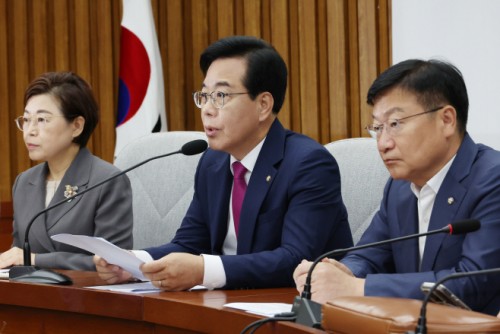 |
| Song Eon-seok, interim leader and floor leader of the People Power Party, speaks during a policy meeting at the National Assembly in Yeouido, Seoul, on July 11. / Source: Yonhap News |
Rep. Song Eon-seok, interim leader and floor leader of the ruling People Power Party (PPP), on July 11 proposed forming a special judicial reform committee in the 22nd National Assembly to discuss prosecutorial reform together with the Democratic Party of Korea (DPK).
Speaking at a PPP strategy meeting at the National Assembly in Yeouido, Seoul, Song said, “The People Power Party agrees that prosecutorial reform is necessary,” emphasizing the need for reforms that prioritize protecting the rights of ordinary citizens and crime victims.
Citing the example of the 18th National Assembly’s Special Committee on Judicial Reform, Song recalled, “Over the course of 16 months, we held 64 meetings and seven public hearings, and heard from 32 experts. It was widely praised for achieving meaningful reforms through rigorous debate.” He added, “When it comes to critical issues like prosecutorial reform, direction is more important than speed.”
Song expressed concern over delays and investigative gaps caused by the previous administration’s legislation to curtail prosecutorial investigative powers, commonly referred to as "complete deprivation of prosecution investigation authority." “In April 2022, just one month before the end of the Moon Jae-in administration, the so-called reform was hastily rammed through like flash-cooked beans,” he said.
He argued that the rushed law has weakened the state's ability to investigate crimes affecting ordinary people and has caused severe delays in trials. “This botched reform has led to what many are now calling a ‘fraud paradise,’” he said.
Song also criticized the DPK’s new prosecutorial reform initiative — a package of four bills that includes abolishing the prosecution service and creating separate bodies for indictments, major crimes, and national investigations — saying, “These bills would turn the prosecution into a totalitarian weapon like the Chinese Communist Party’s disciplinary commission.”
Most Read
-
1
-
2
-
3
-
4
-
5
-
6
-
7





















